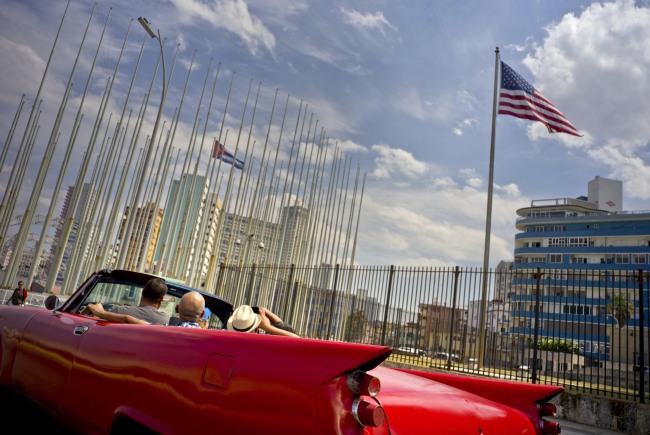U.S. President Barack Obama is due in Cuba Sunday to bury the hatchet in a more than half-century-long Cold War conflict that turned the communist island and its giant neighbor into bitter enemies.
Reversing generations of US attempts to cut Cuba from the outside world, Obama, First Lady Michelle Obama and their two daughters will arrive in Havana for a three-day trip.
It won’t just be the first visit by a sitting US president since Fidel Castro’s guerrillas overthrew the US-backed government of Fulgencio Batista in 1959, but the first since President Calvin Coolidge came 88 years ago.
Obama, seeking to leave a historic foreign policy mark in his final year in office, was due to see old town Havana late Sunday, hold talks with Cuban President Raul Castro on Monday, and attend a baseball game before leaving Tuesday.
 |
| Tourists ride a vintage American convertible as they drive next to the American flag and a Cuban flag at the United States embassy in Havana, Cuba, Friday. (AP-Yonhap) |
For Cubans dreaming of escaping isolation and reinvigorating their threadbare economy, the visit has created huge excitement.
Havana’s old town is crawling with painters sprucing up the picturesque streets and the Stars and Stripes — for so long the enemy flag — flutters from numerous buildings.
The owner of a popular restaurant even put up a poster of Obama, apparently the first ever shown in a country more used to images of revolutionary leaders like Che Guevara.
“A president of the United States in Cuba arriving in Havana on his Air Force One and presumably being received with smiles, applause and bands! Never in my dreams or nightmares could we have imagined that we’d see such a thing,” popular Cuban writer Leonardo Padura said on the Cafefuerte blog Friday.
On the eve of his visit, Obama even cracked jokes with one of the communist country’s most loved comedians, Panfilo, in a three and a half minute video sketch released online.
The visit will not resolve all questions — or make everyone happy.
Although Obama has already loosened restrictions on US citizens visiting Cuba, the lifting of the decades-old US economic embargo can only be decided by a Republican-dominated Congress that is far less keen on detente with Raul Castro’s Cuba.
Republicans and some human rights activists have also criticized Obama for dealing with Castro when so many freedoms in Cuba, ranging from the media to politics and economic entrepreneurship, remain highly curtailed.
Dissidents called on the eve of the visit for Obama to promote “radical change,” notably a “stop to repression and use of physical violence against all political and human rights activists.”
The Castro government warned Obama ahead of his arrival that lectures on democracy would be “absolutely off the table.”
But White House deputy national security adviser Ben Rhodes insists that the subject will be brought up and that Obama will also meet members of Cuba’s beleaguered opposition, “people who’ve shown great courage in pursuing their rights and pursuing a better future for the Cuban people.”
On Tuesday, Obama will give a speech at the National Theater that will be carried live on Cuban television, giving him a unique platform to make his case.
What seems sure is that both sides have accepted that there will be no going back on their original 2014 decision to end the standoff.
The United States spent decades trying to topple the communist government.
Washington tried economic strangulation, the failed 1961 Bay of Pigs invasion, and CIA assassination plots against Raul Castro’s more famous brother Fidel — including the legendary, but unproven story of sending him an exploding cigar.
Now, after so many failures, Obama has bet that soft power will achieve what muscle could not. The aim, Rhodes said, is to make “the process of normalization irreversible.”
And Cuba’s regime, which for decades defined itself as the people’s bulwark against the Yankee enemy, has bowed to the fact that Cubans would rather do business than make war.
In the latest sign of this, US group Starwood Hotels & Resorts Worldwide said Saturday it had signed three hotel deals in Cuba, a first for any hospitality company since the revolution more than 50 years ago.
“We live off tourists. Now with the Americans coming, it will mean a better life,” said Reinaldo Peres, 42, a waiter in central Havana.
As if Obama’s arrival were not enough to illustrate the sea change in Cuba, the Rolling Stones — a symbol of the cultural imperialism that communist leaders raged against — are playing a free concert in Havana on Friday. (AFP)

